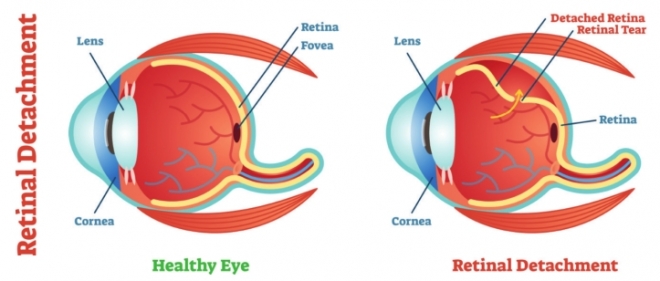DETACHED RETINA SURGERY

You’ve heard it before.
“Things can change in the blink of an eye.”
I had heard it, too. And now I’ve lived it. Jan. 21. A Sunday afternoon. Driving home from an out-of-town funeral.
My life changed in the blink of an eye. My left eye, to be specific.
With no warning, cars became blurry and the yellow center-line became squiggly. A dark “curtain” dropped down over my vision.
Two months, one surgery, several sleepless nights and a lot of wasted eye drops later (it’s hard putting drops in an eye out of which you can’t see), I am functioning.
Not as well as I used to, but well enough. In a previous life, I was the administrator
for the medical practice of a retina specialist. I heard patients describe the exact same symptoms that I was experiencing. So I was not surprised when, later that night, the diagnosis was confirmed.
I had suffered a detached retina. Three days later, I was being wheeled through the bowels of the hospital and into an operating room. “Wait a minute! Y’all know I’m not a heart patient, don’t you?” It doesn’t matter. Retinal detachment surgery is a big deal. They do it in a real operating room. But as I soon found out, the recovery is an even bigger deal.
The National Eye Institute defines a retinal detachment as when the light-sensitive layer of tissue that lines the inside of your eye lifts or pulls from its normal position. Approximately one in 10,000 people suffer a detached retina.
That is not the lottery I wanted to win.
For the first week after surgery, I spent 45 minutes of every waking hour with my head in the “down” position – as in face down.
Think about that: 45 minutes of every waking hour staring straight down.
I realized my floors needed cleaning. The hours I wasn’t awake were spent trying to sleep face down.
Ever try that? Don’t bother. Ever try sleeping on your side all night? Don’t bother with that, either.
The reason for the “head down” position is to float into place the gas bubble the surgeon puts in your eye. The bubble helps reattach the retina.
The bubble also means you won’t be seeing out of that eye for several weeks, as the bubble covers your entire field of vision. Some people absorb the bubble slower than others.
Guess which group of people I’m in? As I write this, it’s been seven-and-a-half weeks since surgery. The bubble has decreased approximately 75 percent. That means in my left eye, I only see about three-fourths of what you see. But, hey, when you come from seeing 0 percent of what you see, the world never looked better!
My equilibrium is off. My peripheral vision is limited. It helps to hold on to a railing when walking or a chair when sitting down or standing up. I’m a little nervous/jittery around crowds. For a couple of weeks, I wore a patch that would make a pirate proud. That helped from getting headaches caused by seeing normally out of one eye and seeing half-blurry objects out of the other eye.
The freedom to get in my car and go where I want when I want was gone.
But the purpose of this column is not to get your sympathy.
Well, that’s not true. I do want you to have sympathy. But not for me.
I want you to feel sorry for the many people – most of them much older than me – who can no longer see well enough to drive. Who can’t go and do as they please.
It must be awful.
It is awful.
I want you to feel sorry for those who wake up every day with little to look forward to, knowing they won’t be going anywhere unless someone comes and gets them.
That was me. Four weeks of knowing I wasn’t going anywhere. Sitting at home 24 hours a day.
Yes, I will be forever grateful to the few who took time from their work and family to drive me to doctor appointments and the grocery store. When you can’t see, the places you “must” go are very limited.
Let me be clear. I realize there are many people worse off than me. Their setbacks are permanent. Mine are, hopefully, relatively temporary.
I believe God gave me this test of mental strength and patience for a reason. Maybe he wanted me to know I am stronger – and more patient – than I thought.
But tests are also a way of learning. I have learned that having the freedom to go and do what you want – when you want – is something not to be taken for granted.
So after you read this, you may get in your car to pick up the kids, go to work, or take the family to dinner. But before you start your car, pause for just a minute. Look up and say “thank you” for being able to do that.
And also appreciate what you see when you look up. You never know when you may not see it again.
-– Tony Taglavore
